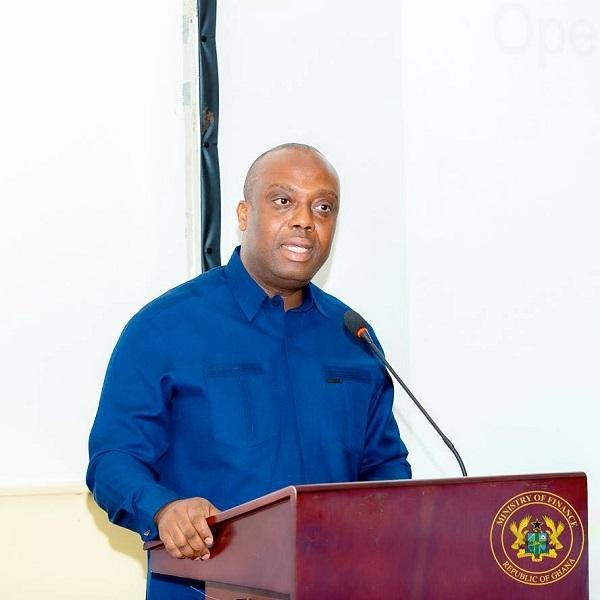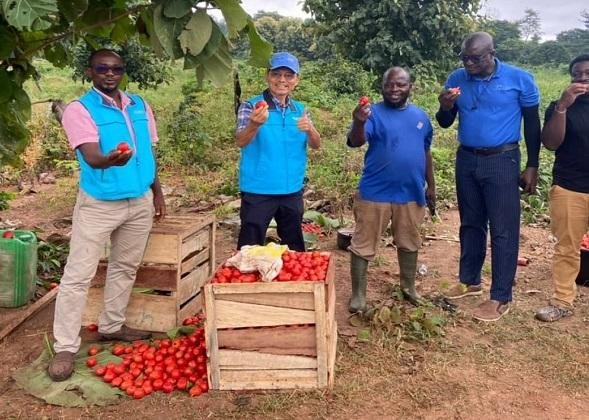News
Government to spend GH¢13.9 billion on infrastructure in 2025 – Deputy Finance Minister

Government will commit GH¢13.9 billion in 2025 to priority infrastructure projects under its “Big Push” initiative, with the amount projected to rise to GH¢21.2 billion by 2028, Deputy Finance Minister Thomas Ampem Nyarko has announced.
According to him, the funds will be drawn mainly from petroleum revenues under the Annual Budget Funding Amount (ABFA) and mineral royalties.
He indicated that the projects will focus on roads, transport, energy, power generation, digital infrastructure, and urban and rural development.
Mr. Ampem described the “Big Push” as an economic reset powered by a US$10 billion programme, stressing that the country’s infrastructure needs remain urgent.
He explained that Ghana requires US$37 billion every year for the next 30 years to meet development goals across sectors. Maintaining existing infrastructure alone, he added, will cost an extra US$8 billion annually.
The Deputy Minister drew attention to Ghana’s score of 47 out of 100 on the Global Infrastructure Hub index, which is below the average for lower-middle-income countries.
He argued that this was a sign of chronic underinvestment in critical sectors.
“Our cities need better transport. Our industries require dependable energy. Our farmers need modern irrigation. And our youth demand digital highways for the future,” he emphasized.
Mr. Ampem highlighted the limits of government spending, pointing out that the public purse cannot meet the demands alone. He stressed that Public-Private Partnerships (PPPs) are therefore indispensable.
He revealed that the Ghana Infrastructure Investment Fund (GIIF) will set up Special Purpose Vehicles (SPVs) to attract private capital, blended finance, and international development funding.
The Deputy Minister urged both local and international investors to explore opportunities in transport, energy, digital infrastructure, and urban development, describing them as “vast and transformative.”
He assured that the framework is in place, the vision is clear, and the government’s commitment under President Mahama’s leadership remains firm.
Mr. Ampem called for strong collaboration between government and the private sector, noting that sustainable infrastructure transformation will require a united effort.
The announcement was made at the KPMG Infrastructure Roadshow in Accra, held under the theme “Unlocking Ghana’s Public-Private Partnership Potential: Bridging Reform and Results”.
The event brought together policymakers, investors, engineers, and business leaders to explore strategies for accelerating infrastructure development.
By: Jacob Aggrey
News
No ban on Odwira Festival – Okuapeman spokesperson

The spokesperson for Okuapehene, Ohenenana B.S. Opoku, has dismissed social media reports that there is insecurity in Okuapemam and for that matter an indefinite ban has been placed on the celebration of this year’s annual Odwira Festival.
Ohenenana Opoku, who is also a member of the Odwira Festival Planning Committee, said Odwira would be celebrated and all the necessary arrangements have been made for a peaceful celebration.
According to him, there is no merit in all the allegations on the media space because there has not been any chieftaincy dispute in any of the divisional heads in the area.
“There is absolute peace in Okuapeman, therefore, all Okuapeman citizens living in Ghana and abroad should come home to celebrate the Odwira Festival.”
In a press briefing at the Okuapeman Palace in Akropong on Friday, Ohenenana Opoku described the allegations as false, stating that all the divisional chiefs have been gazetted and recognised in Ghana’s Chieftaincy records.
He said Okuapemam has been celebrating Odwira Festival for the past five years under the leadership of Oseadeeyo Kwasi Akuffo III without any dispute.
He emphasised that Okuapeman constitutes 17 major towns with their own chiefs under Okuapemanhene and that nobody has the right to ban or stop any chief from celebrating it.
Ohenenana Opoku appealed to the people of Ghana to come and enjoy the Akuapem Odwira Festival which is one of the best cultures in Ghana.
In view of that, the Yagbonwura, Bii-Kunuto Jewu Saole, has accepted to grace the festival as the special guest of honour.
By Linda Abrefi Wadie
Join our WhatsApp Channel now!
https://whatsapp.com/channel/0029VbBElzjInlqHhl1aTU27
News
Lead contamination in products can cause anaemia, brain damage — UNICEF, FDA

Childdren and pregnant women in Ghana are unknowingly being exposed to toxic levels of lead in everyday products, a new study by UNICEF and the Food and Drugs Authority (FDA) has revealed.
The nationwide study, which covered all 16 regions, found dangerous levels of lead contamination in items such as cosmetics, food, and household products, posing significant threat to public health, particularly to children and women of childbearing age.
A statement on the report copied to The Spectator in Accra on Monday explained that several commonly used items contained alarmingly high concentrations of lead.
Lead, a heavy metal used in batteries, paints, ceramics, and other industrial materials, is highly toxic even in small quantities.
Experts warn that it can cause irreversible brain damage, developmental delays, learning difficulties, and behavioural problems in children.
The study stressed that there were no safe levels of lead in the human body.
Traditional eyeliners known locally as kaji kaji or kholi, which many mothers use to brighten their children’s eyes, had contamination levels tens of thousands exceeding permissible limits.
White baked clay, called shire, ayilor, or farinkasa and commonly consumed by pregnant women to ease nausea, also tested positive for lead contamination in about 25 per cent of samples, with the highest rates recorded in the North East and Greater Accra regions.
Ground turmeric, a staple spice used across Ghana, was found to be contaminated in 42 per cent of samples, with particularly high levels in the Greater Accra (84 per cent), Central (75 per cent), and Bono (60 per cent) regions.
Similarly, locally prepared corn-based cereal (Tom Brown) showed lead contamination in 4.4 per cent of samples, mostly from the Eastern Region.
Old plumbing systems and certain cookware were also identified as possible sources of exposure, as lead can leak into drinking water or food during cooking.
The health impacts are severe. Lead exposure can cause anaemia, stunted growth, hearing loss, seizures, and pregnancy complications such as low birth weight and miscarriage.
UNICEF has, therefore, called for immediate national action to address the crisis, calling for public awareness campaigns, stricter enforcement of product safety standards, and routine screening for lead exposure, especially among vulnerable groups.
UNICEF reaffirmed its commitment to supporting the Government of Ghana and relevant partners to eliminate lead exposure and safeguard the health of every woman and child.
By Esinam Jemima Kuatsinu
Join our WhatsApp Channel now!
https://whatsapp.com/channel/0029VbBElzjInlqHhl1aTU27











